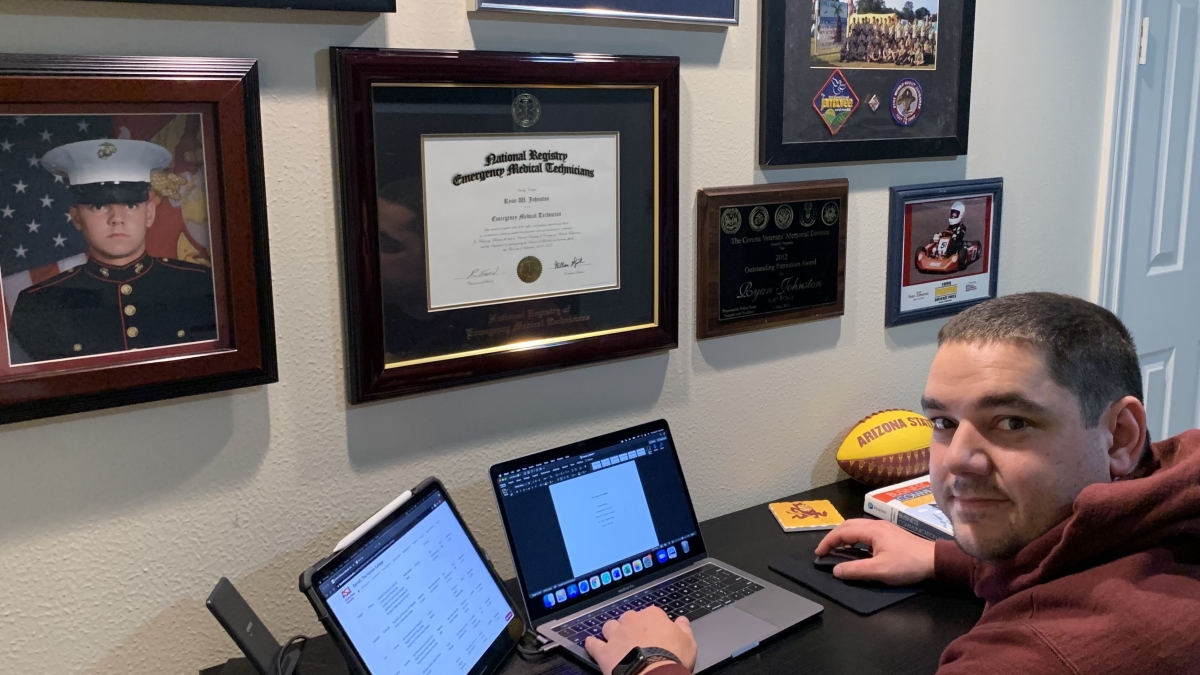US Marine veteran finds meaningful connections as an ASU Barrett Honors online student

After a career in the military and work as a firefighter, dispatcher and emergency medical technician, Ryan Johnston decided to go back to school. He is an ASU Online student pursuing a bachelor's degree and was in the first cohort of the Barrett Online program.
Ryan Johnston admits that he never saw himself as a university student.
In fact, 12 days after graduating high school in 2012, he entered the United States Marine Corps boot camp in San Diego, where he trained as a firefighter.
After boot camp, he was stationed at Camp Pendleton in California as an aircraft rescue firefighter.
“In my first year of service, I was grateful to be deployed to Afghanistan in support of Operation Enduring Freedom,” he said. He finished the rest of his four years in the Marines in the U.S.
After his service, he studied fire technology, prevention and safety at a community college and combined that with his Marine experience to work as a park ranger in Glendale, Arizona, and a firefighter, dispatcher and emergency medical technician in the Republic of the Marshall Islands.
“I never saw myself going to a university. It wasn't until years after my service that I was in my professional career as a firefighter that I decided to utilize my GI Bill and go back to school,” said Johnston, who currently is an online student at Arizona State University working toward a bachelor’s degree in public service and public policy with a concentration in emergency management and homeland security.
He also among the first cohort of students in the pilot online program of Barrett, The Honors College at ASU that allows students to take the honors college’s signature course The History of Ideas and partake of honors events and activities. It is the first such online program offered by an honors college.
The program started last year with 48 upper division students who studied together in a hybrid format, with some sitting in class and others joining online via Zoom. Johnston’s class was in Barrett at the ASU Polytechnic campus. After a successful pilot, Barrett Honors College is continuing its online program this fall.
“I chose ASU Online, as I was working overseas at the time I applied, and saw that ASU had one of the top-ranked online programs. As for Barrett, I was always curious about the program, but there wasn't an opportunity for any honors online courses. It wasn't till I was between sophomore and junior year that I received an email from Barrett saying they were starting an online inaugural program,” he said.
Johnston, a Southern California native, said he is gratified to be able to take university courses online and reap the benefits of Barrett Honors College.
“Barrett has benefitted me in a multitude of ways. The first class I took with Barrett, The History of Ideas, taught by Dr. Mary-Ingram Waters, has made me think much more critically,” he said.
“Another benefit is the multitude of programs within Barrett — everything from cultural development to engineering, and more. If you want to learn about something, you can at Barrett. I've enjoyed this opportunity very much. It has opened a lot of doors that I never even considered before going back to school, let alone attending Barrett,” he said.
Johnston said through Barrett Online he has connected with and developed helpful relationships with faculty.
“I plan on working towards my master’s degree by utilizing ASU’s 4+1 program and also plan to apply for Georgetown’s MPS program in disaster management. In both programs, I will need academic references. Barrett has given me the ability to work with a multitude of professors that truly enjoy seeing their students succeed in our academic goals. I now know many professors who would be glad to write an academic reference,” he said.
What advice does Johnston have for folks like himself who may have been away from academia for a while and are contemplating becoming students again?
“I was unsure about going back to school at first because I had been away from structured education for a very long time. Once I did start going back, I was surprised at how much my life experience was able to benefit me academically,” he said.
“I believe that if you want to earn your degree, you should definitely go back to school, as there are many programs that will help you along the way. I think most people will be surprised at how well they will actually do.”
More Sun Devil community

ASU student, Navy vet pursues greener future in sustainability
As Arizona State University holds its annual Salute to Service celebration, honoring individuals who serve the nation and…

No limits to a mother’s love, a wrestler’s determination
Judy Robles was washing dishes in the kitchen of her California home and keeping an eye on her young son, who was playing in the…

A symphony of service: Iraq War vet and ASU alum finds healing through music
At the age of 30 and only one credit away from obtaining his bachelor’s degree in piano performance, Jason Phillips could no…